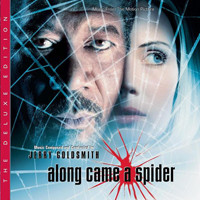- Composed by Jerry Goldsmith
- Varèse Sarabande / 66m
Along Came a Spider was the second movie starring Morgan Freeman as James Patterson’s master detective Alex Cross (after Kiss the Girls). Given how wildly popular the books are it’s a bit of a surprise that the movies haven’t ever really taken off – a more recent attempt to launch a cinematic franchise based on them, Alex Cross starring Tyler Perry, disappeared almost without trace.
Jerry Goldsmith had enjoyed his collaboration with director Lee Tamahori on The Edge a few years earlier – a very entertaining action adventure with an expansive, wonderful score. Needless to say this movie required very different music – indeed, it’s about as far from expansive as you could get. After gradually making his style for these action/thrillers more and more elaborate through the 1980s and into the early part of the 90s, Goldsmith began paring them back again until he was back writing in a style somewhat more akin to the very taut scores he wrote in the 70s and Along Came a Spider (one of his final scores) is the culmination of that.

This is evident from the opening cue, the extremely sparse “Night Talk”, with a creepy-crawly synth effect which scurries across the stereo spectrum providing most of the heavy lifting, the orchestra very much relegated to a secondary role. The very brief “Alone” offers a tender piano solo before we get to one of the best cues, the action track “Megan’s Abduction”, which builds off the same template as those in Chain Reaction (another Morgan Freeman thriller) from a few years earlier. It’s much less frenetic music this time round though, doing exactly what it needs to do for the film but no more.
I love the low-end piano and brass in “A Closed Book”, a great suspense technique that was one of this composer’s staples. Much of the score’s suspense music is a lot subtler than this though, with high strings often combining with synth effects to prompt some sort of psychological reaction – and it’s effective, but not thrilling as an album experience.
“Megan Overboard” is another decent action track, built on exactly the same material as the earlier “Megan Abducted”, but the pick of them is “The Ransom”, one long track on the original album now split into two for the deluxe edition (and then heard again, slightly cut down, pasted on to the end of the finale “Not My Partner”, as it is in the film for the end credits). It’s energetic, robust action music full of the techniques that made Goldsmith the undoubted master and shines above everything else in the score.
Don’t expect the kind of grand, sweeping finale Goldsmith wrote for films like Chain Reaction and US Marshals, when all of a sudden at the end of the films he somehow conjured up something that wouldn’t sound out of the place in Gone with the Wind – this score lacks that kind of thematic undercurrent running through it which could then be turned into the rousing ending – indeed, the unusual lack of a single central theme here certainly hampers the score as an album experience. (There is a theme which is heard a few times, but the composer never really lets fly with it.)
I’ve been a great defender of the music of Jerry Goldsmith’s later period for as long as I’ve been writing about film music (which is a long time) but even I struggle to muster much enthusiasm for Along Came a Spider, surely one of the least interesting scores he ever wrote. The new deluxe edition almost doubles the length of the original album but I’ve found little of genuine interest in the new material, with the three or four solid action tracks now just spread out more thinly. I say this as an unashamed Goldsmith die-hard and only those few people who are even more devoted fans than I will probably get too much out of it.
Rating: **
facebook.com/moviewave | twitter.com/MovieWaveDotNet | amazon.com












Hello James. It is a real pleasure to read you again. For my part, I was very pleasantly surprised by this Deluxe edition which is much more consistent in its listening than the first CD version. I listen to it very regularly on headphones and this music is a wonderful accompaniment to my reading of Scandinavian novels. I agree with you on one point, it is certainly not the greatest composition of Goldsmith but I find the double track “The Random” formidable in its construction. I also saw the film again on the occasion of the album’s release and the music is perfect and makes up for the shortcomings of a somewhat sluggish investigation. Once again the music of the master surpasses its original material. I look forward to reading your next reviews. Best regards.